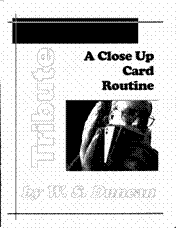©2004 Bill Duncan
Softcover

Image from Bill Duncan
| Duncan, Bill: Tribute ©2004 Bill Duncan Softcover |
 Image from Bill Duncan |
Comments (Bill Duncan): The routine is designed to be performed while standing, and requires only a simple setup of the four aces. Also in the manuscript are alternate ideas and methods for all the framing effects. Finally a short series of essays offer examples of how to chose effects and combine them to create a routine and on how to develop that all important personal connection with your audience. Available from Bill Duncan: http://home.comcast.net/~wsduncaniv/Website.htm
Contents (numbers are not page numbers):
1 Producing The Aces ( 3 methods )
2 Triple Cut Ace Production: A flashy ace production with a one,
two, two at once, progression. Simply cull the four aces and go!
Flashy and not too difficult to master.
3 Easy Expert Aces: An alternate handling for producing the aces
when performing seated at a table. If you can do a slip cut you'll
be doing this one in a day.
4 Two At Once: Requires a more complex setup than Triple Cut Ace
Production but the humorous third beat and magical climax make it
worth the extra effort.
5 Twisting The Aces ( two methods )
6 Free Will Aces: An impromptu twisting the aces routine where a
spectator is encouraged to choose the order in which the aces turn
face up.
7 Reputation Maker Aces: The addition of an extra (gaffed) card
makes for the cleanest, most convincing Twisting The Aces you can
imagine. The aces are spread in a fan and one card is reversed.
Both sides of the fan are shown. Finally, a climactic fifth effect
is performed which ads a logical finish to the effect and unloads
the gaffed card.
8 Our Feature Presentation: The Ambitious Card
9 An Ambitious Young Man: The routine is in three phases with a
total of seven ascensions, ending with the card appearing face up
on top while the pack is out of the performer's hands.
10 The Encore: Triumph ( three methods )
11 Standing Triumphant: An in-the-hands version of Triumph
(without the slop shuffle) that’s designed for walk around
conditions. Very convincing and easy to do.
12 Infinity Triumph: A variant of the Vernon classic. For
performance while seated at a table.
13 Final Triumph: For those occasions when you have time for a
deck switch and a powerhouse ending.
14 The Essays
15 Presentational Notes: Full script and stage direction along
with notes on why the scripts are structured as they are. The
emphasis is on how to manipulate the audience's emotions and
create the group dynamic which makes the magic fun for both the
audience and the performer.
16 Strong Tricks: A few thoughts on what it takes to make a strong
magic routine.
17 Closing Comments: A few final thoughts on how to create
routines of your own.
